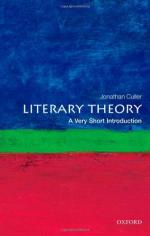
|
| Name: _________________________ | Period: ___________________ |
This test consists of 15 multiple choice questions and 5 short answer questions.
Multiple Choice Questions
1. In Chapter 2, it is suggested that British literature worked to do what among the classes?
(a) Instill a stronger sense of class.
(b) Create a divide.
(c) Invoke shame.
(d) Create harmony.
2. Rousseau was concerned that what form of communication could be easily misinterpreted?
(a) Gossip.
(b) Speech and writing.
(c) Singing.
(d) Speech.
3. According to Goethe, "life devoid of passion" is ___________.
(a) Typical.
(b) Meaningless.
(c) Difficult to achieve.
(d) An honor.
4. In Chapter 3, "Literature and Cultural Studies," what does the production of literature drive in society?
(a) The readers.
(b) The teachers.
(c) The church.
(d) The culture.
5. Who believed language is made up of a system of differences?
(a) Marlowe.
(b) Jackson Shephardberg.
(c) Shakespeare.
(d) Ferdinand de Saussure.
6. Many theorists believe that understanding the meaning of words in a text is ___________.
(a) Complex.
(b) All of these.
(c) Elusive.
(d) Interesting.
7. In what century did Rousseau write?
(a) 17th century.
(b) 18th century.
(c) 19th century.
(d) 12th century.
8. Based on "What is Theory?" which of the following words can be used to describe theory?
(a) Literal.
(b) Unfocused.
(c) None of these.
(d) Scattered.
9. What is the purpose of literary theory, according to "What is Theory?"
(a) To transcend ignorant readers.
(b) To reflect on ideas.
(c) To tame the masses.
(d) To prove writing wrong.
10. According to Chapter 4, how many specific elements do theorists analyze when considering a word in the text?
(a) Four.
(b) Three.
(c) Five.
(d) Zero.
11. What literary approach begins a work with no preconceived ideas in an effort to discover its meaning?
(a) Hermeneutics.
(b) Poetics.
(c) Translation.
(d) Justification.
12. Who was Michel Foucault?
(a) A Swiss banker who knew poetry.
(b) A Russian doctor who loved literature.
(c) A Spanish immigrant professor.
(d) A French intellectual historian.
13. For what types of literature has cultural studies gained new attention?
(a) Short form literature.
(b) Poetry.
(c) Literature with cultural issues.
(d) Literature with animal themes.
14. In "The History of Sexuality," what was used as a blanket term to describe all aspects related to sexuality?
(a) Imagination.
(b) Evolution.
(c) Sex.
(d) Procreation.
15. What type of study is approached clinically?
(a) Cultural.
(b) Literary.
(c) Poetry.
(d) Nomanclature.
Short Answer Questions
1. What nationality was Rousseau?
2. According to Chapter 3, which author continues to stand the test of time?
3. What form of structuralism organizes culture into certain, rule-based practices?
4. According to studies, the majority of film and literature has been created from whose point of view?
5. Interpellation studies the effect of ______________ in shaping an individual's actions.
|
This section contains 387 words (approx. 2 pages at 300 words per page) |

|




